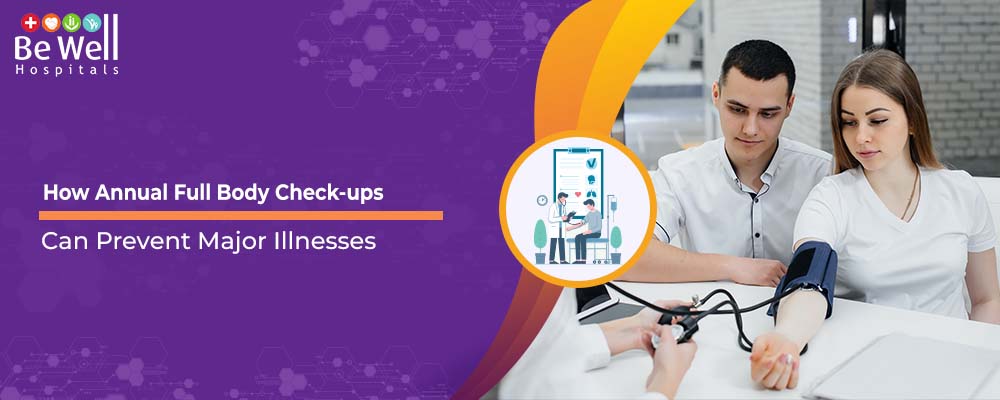How Annual Full Body Check-ups Can Prevent Major Illnesses

Introduction
In today’s fast-paced world, lifestyle diseases such as diabetes, hypertension, heart disease, and obesity are on the rise—often catching people off guard due to a lack of early symptoms and late diagnoses. With hectic schedules, poor dietary habits, sedentary lifestyles, and stress becoming the norm, many individuals are unaware of underlying health issues until they become severe. This is why proactive health screening is no longer a luxury but a necessity. Early detection through regular health check-ups not only prevents complications but also offers a chance to make timely lifestyle changes that could save lives. A comprehensive full body check-up typically includes a range of tests such as blood work, liver and kidney function tests, lipid profiles, ECG, chest X-rays, and more—designed to provide a holistic picture of your current health status. In this blog, we will explore the importance of regular screenings, what a full body check-up entails, and how early action can lead to better long-term health outcomes.
The Purpose of an Annual Full Body Check-up
An annual full body check-up serves as a crucial preventive tool that helps individuals stay ahead of potential health issues. Many serious conditions—such as hypertension, diabetes, high cholesterol, and even certain cancers—often progress silently without any noticeable symptoms until they become severe or life-threatening. Through regular screening, these silent diseases can be detected early, when treatment is most effective and outcomes are more favourable. Beyond detecting existing problems, a yearly check-up helps in monitoring key health parameters like blood pressure, blood sugar levels, cholesterol, liver and kidney function, and more—enabling both patients and doctors to spot trends or changes that could indicate developing issues. Perhaps most importantly, these check-ups play a vital role in identifying risk factors—such as obesity, poor nutrition, lack of exercise, or genetic predispositions—before any symptoms appear, allowing for proactive lifestyle changes and interventions. In this way, an annual full body check-up is not just about checking for disease—it's about staying informed, staying in control, and taking charge of your health before problems arise.
Common Illnesses That Can Be Prevented or Managed Early
Regular full body check-ups are essential in preventing and managing chronic illnesses before they escalate. Early detection enables timely treatment, lifestyle adjustments, and improved long-term outcomes. Here are some conditions that can be caught early:
Proactive health screening isn't just about treating illness—it's about maintaining balance and preventing future complications. A simple annual check-up can be the key to a healthier, longer life.
Components of a Standard Full Body Check-up
A full body check-up is a comprehensive health assessment designed to catch issues early and provide a clear picture of your overall well-being. Here are the key components typically included:
A full body check-up isn’t just a diagnostic step—it’s a proactive investment in your long-term health.
Age and Gender-Specific Recommendations
Regular health screenings tailored to age and gender are essential for early detection and prevention of various health conditions. Here's a concise guide to recommended screenings:
Adhering to these age and gender-specific screenings ensures timely intervention and promotes long-term health.
How Regular Check-ups Lead to Long-Term Savings
Regular health check-ups are not just about detecting illness—they are a smart investment in long-term well-being and financial stability. By identifying potential health issues early, individuals can take timely action and avoid expensive treatments later. Preventive care helps catch conditions like hypertension, diabetes, or high cholesterol before they escalate into severe complications that require costly hospitalization. Managing chronic diseases early also reduces the need for frequent doctor visits, emergency care, or surgeries. Beyond medical savings, regular screenings support better energy levels, fewer sick days, and improved focus—leading to greater productivity and a higher quality of life. Simply put, a proactive approach to health today ensures peace of mind and financial savings tomorrow.
Conclusion
Prevention is powerful—and when it comes to our health, it is the smartest step we can take. Annual health check-ups serve as a critical tool in identifying potential problems early, tracking vital health parameters, and empowering individuals to make informed lifestyle choices. Rather than waiting for symptoms to appear, these preventive screenings enable timely interventions that can significantly reduce the risk of serious illness, hospitalisation, and long-term complications. Encouraging a culture of proactive health behaviour isn't just about extending lifespan—it's about improving the quality of life at every stage. Your body is worthy of frequent check-ups, care, and attention.
As the saying goes, “Your annual check-up is your annual investment in a longer, healthier life.” Start investing today—visit our Preventive Care Department at Be Well Hospitals or call 9698 300 300 to book an appointment and begin your path to a healthy future for all.
